Brown Bag Series
Credit Default Swap (CDS): An Optimal Hedging Device or a Pandora's Box
Dr. IIfan Oh
11/4/2025
In CBER Brown Bag Seminar Series, Dr. IIfan Oh, Assistant Professor at the School of Economics and Social Science (SESS), IBA, Karachi, delivered a talk on “Credit Default Swap (CDS): An Optimal Hedging Device or a Pandora's Box" on April 11, 2025.
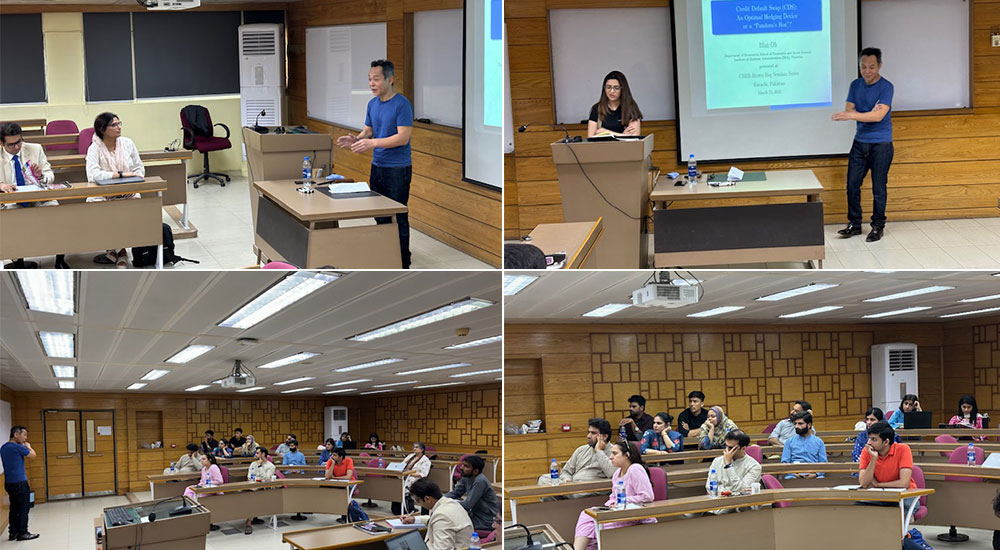
The Caducei of Mercury in the Mantegna Tarocchi
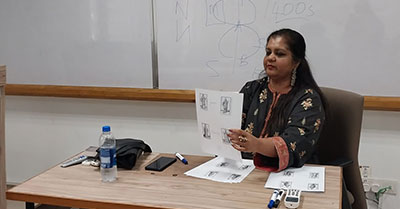
Dr. Nadya Qamar Chishty-Mujahid
17/2/2025
The present-day college fraternity, Kappa Sigma, claims to be descended from a brotherhood established in Renaissance Italy in the 1400s. I believe that their claim has some historicity—in fact, the brotherhood is descended from an early Freemasonic brotherhood, that honoured the deity Hermes/Mercury (the god of speed, twins, and communication). I regard the famous set of Mantegna tarocchi engravings as being not only a set of copperplate engravings depicting forms of humanistic instruction, but also a means by which Mercury's symbol (the caduceus) was honoured. The Mantegna exists in two forms, the E series and the S series (I regard them as twin series of the tarocchi—they are very similar but not identical). Using the first groups of both series (the first ten images of each), in 2008 I postulated that the images form a caduceus structure. For the purpose of this talk I will examine all five groups of the Mantegna tarocchi (a hundred images in total) in order to underscore the importance of these images, their links to Kappa Sigma (whose main image is in fact the caduceus), and their esoteric significance to what I regard as very early Freemasonry.
Retirement Is What You Make of It! - a Journey towards Rightsizing from Downsizing!
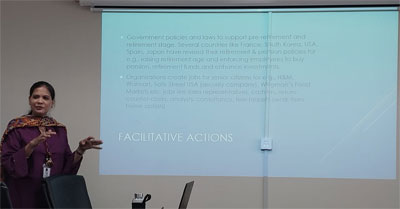
Tehzeeb Sakina
25/11/2024
Retirement is a difficult transition phase, having financial, emotional, and physical challenges. It may seem to be the end of the road, but the silver lining is that the better one plans for retirement, the merrier it will be. Along with the financial planning, retirees and to-be-retirees need to plan the downsizing and rightsizing they must go through during this time of life. Downsizing is the action of limiting possessions and adopting a minimal lifestyle. At the same time, rightsizing is the psychological and emotional readiness toward downsizing. A better-planned retired life would be overcoming the challenges and well-sorted strategies. If the decisions related to downsizing and rightsizing are made by the retiree (himself), it will give him a feeling of control, and the ownership of decisions lies with him only.
Book Chapter in the book titled 'Retirement Bliss: planning, real estate and financial security' by Emerald Publishing
Experiences of Pakistani Immigrant Women in Arranged Marriage Situation: Role of Agency and Power
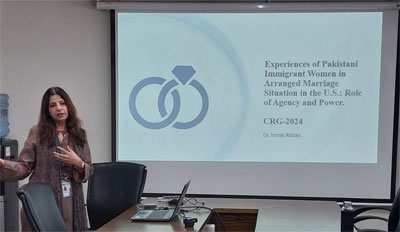
Ismat Abbas
5/11/2024
The South Asian diaspora is flourishing due to ever-growing migration to western countries, thus bringing a decline to arranged marriages but still happening in many families (Zaidi, 2016). There has been a growing dialogue on the arranged marriage model of mate selection, especially in South Asian subcontinent societies that are deeply rooted in the patriarchal structure. Women are the significant bearers of power dynamics with visibly defined strict gender roles for women (Mumtaz, 2003). There is now a debate and negotiation of many young adults and parents living in the western countries on the utilities of arranged marriages. This qualitative interview study aims to document lived experiences of South Asian immigrant women in arranged marriage setups and understand how these women navigate their lives in an unfamiliar environment of the host culture, due to arranged marriages in the U.S and Canada.
"We don't believe in [the] Coronavirus; we believe in Allah. Whatever happens, it happens from Allah": Pakistani media's response to countering conspiracy theories during the COVID-19 pandemic.
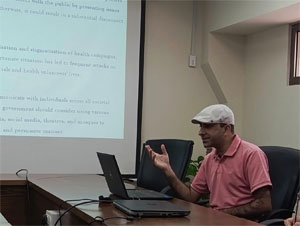
Amir Hamza Marwan
23/10/2024
This study examines the coverage of the COVID-19 pandemic by the four leading newspapers of Pakistan — Dawn, The News, Daily Times, and The Nation — when they were responsible for informing and educating the public during a health crisis hit by conspiracy theories. The researchers utilized content analysis to analyze 1124 news stories. The findings reveal less emphasis was placed on scientifically investigating the causes, precautions, and care of coronavirus and dispelling public misconceptions.
Frontier Rule and Conflict
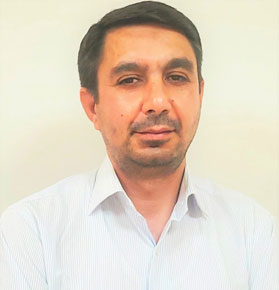
Dr. Faiz Ur Rehman
16/10/2024
CBER and Lincoln Economics, Accountancy & Finance (LEAF), University of Lincoln have collaborated to have joint seminar series of their faculty. In the current seminar, Dr. Faiz Ur Rehman Associate Professor at the School of Economics and Social Science (SESS), IBA, Karachi presented his work at the LEAF seminar series.
The title of his work is "Frontier Rule and Conflict". In this paper they examine whether frontier rule, which disallows frontier residents from a recourse to formal institutions of conflict management and disproportionately empowers tribal elites, provides a more fragile basis for maintaining social order in the face of shocks. Combining a historical border separating frontier from non-frontier regions in north-western Pakistan with 10km-by-10km grid cell-level data on conflict in a spatial regression discontinuity design framework, they show that areas that historically fell under frontier rule experienced significantly higher violence against the state after 9/11. They argue that the 9/11 tragedy represented a shock to grievances against the state which, in the absence of formal avenues of conflict management, led to a sharp surge in attacks against state targets in frontier areas. They show that the surge in 'sovereignty-contesting' forms of violence in these regions was partly carried out through the systematic assassination of tribal elites who were the main pillar of frontier rule that guaranteed social order. In their empirical analysis, they rule out several important competing explanations behind the post-9/11 rise in violence in frontier areas, including the possibility of conflict spilling over from Afghanistan, income shocks (proxied by military operations), and drone attacks.
"Arbi, Turki, Farsi Hindi ya Afghan": Everyday Fiqh in the Mughal Empire
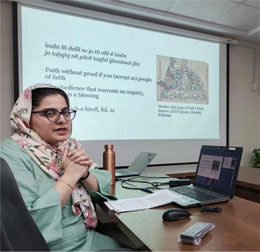
Ilsa Abdul Razzak
14/10/2024
This ongoing research discusses arguments that seventeenth-century manuscripts present about the world of fiqh and sharia (Islamic law and jurisprudence) in the late Mughal Empire. Existing scholarship has sidelined the role of fiqh in the lives of Mughal subjects, even though it dictated not just interpersonal issues, but also their personal domain. This presentation show how a trans-genre and multilingual approach toward manuscripts that are in Persian, Arabic, and Hindavi can bring up various definitions of fiqh and sharia. This research raises questions about how scholars translated and interpreted fiqh for lay communities in the early modern world. While doing that, it attempts to focus on a potential argument: that it was vernacular languages that allowed fiqh to become accessible by all. To make this argument, this research delves into not just unedited early modern texts, but also engages with secondary scholarship from both religious studies and Mughal historiography.
Transdisciplinary Approaches to Mobility and Global Health: Mobility, Heat Stress and Undernutrition in Pakistan and Nigeria

Dr. Nausheen H Anwar
19/09/2024
This project seeks to understand the relationship between mobility, heat stress, and undernutrition. In particular, how internal displacement affects women IDPs. The project has three key objectives: (1) to examine how women IDPs' everyday lives shape vulnerability to heat stress and undernutrition; (2) develop a conceptual framework for how mobility, heat stress and undernutrition relate; and (3) develop policy recommendations to support effective interventions in IDP populations. Fundamentally, it will bridge divides between nutrition and thermal physiology , medical and ethnographic approaches, and scientific and lay knowledge. This project straddles the urban contexts of Pakistan and Nigeria.
Digital Retail Banks: Receptivity of public among third-tier cities of Pakistan
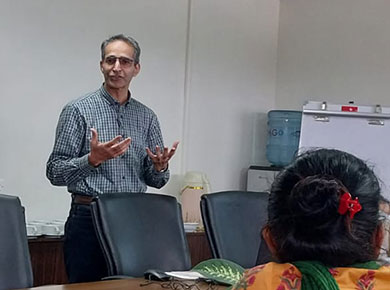
Dr. Saqib Sharif
3/06/2024
The State Bank of Pakistan has recently awarded in-principle approvals to five digital retail banks (DRBs). This initiative will help develop a digital ecosystem, foster a new set of customer experience, provide affordable digital financial services including credit access to underserved segments of the economy. However, the success of post operational commencement of DRBs also depends on the dwellers of small cities’ digital literacy and preparedness adopting digital banking. The proposed study aims to assess the intention of small cities’ customers and explore their readiness for adopting DRBs services. Through survey questionnaires, the study analyzes how the public, who are less exposed to electronic transactions and more accustomed to branch banking, perceive the launch of DRBs and whether respondents’ receptiveness/intention to use depends on demographic characteristics. Hence, this study examines the mediating effect of a number of barrier-breakers on the association between barriers and the intention to adopt digital banking.
Challenges of working mothers-exploring context-specific factors and designing suitable psycho-social intervention
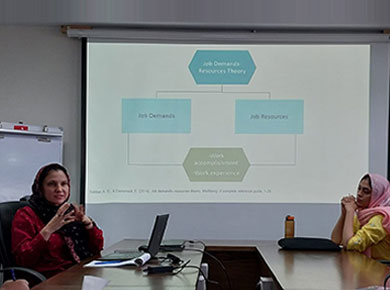
Dr. Saima Saif and Dr. Ayesha Zia
23/05/2024
This talk aimed to present an overview of the progress and framework for subsequent steps linked with the PI’s research guided by the following research questions: 1- What are the main challenges faced by early mid-career mothers working as schoolteachers in private schools of Karachi? 2- How does the intersection of dual roles of teachers as mothers connect with the psychological well-being of women in a neo-liberal educational set-up? 3- Which factors should be considered to develop a contextually and culturally relevant framework for supportive interventions that could facilitate working mothers’ emotional health? We focus on the teacher-mother identity to explore pathways that current theories such as Job-Demand- resources (JD-R) are unable to address, alongside unearthing the generative aspects of the teacher-mother identity. The study is divided into two phases. Phase I focuses on exploring the challenges of teacher-mothers and phase II aims at developing a framework for work-based intervention plan.
Effects of the Natural and Anthropogenic Soundscapes on the Mental well-being of Residents in Karachi
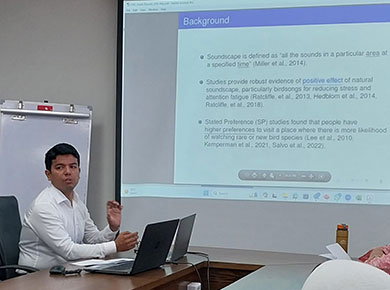
Dr. Ghamz E Ali Siyal, Dr. Ayesha Zia, and Dr. Heman Das Lohano
20/05/2024
Soundscapes are defined as “all sounds in a particular area at a specified time”. Studies provide robust evidence of positive effect of natural soundscape, particularly birdsongs for reducing stress and attention fatigue. However, these soundscapes are not considered by previous studies focusing on housing determinants using Hedonic modelling. Therefore, this study contributes to literature by focusing on three objectives. First, to estimate the effect of natural and non-natural sounds on mental well-being through a lab experiment. Second, to estimate natural and non-natural determinants of housing prices in Karachi. Third, to estimate the effect of natural and non-natural soundscape on mental well-being of respondents living at distinct locations in Karachi. Above objectives will be addressed by using lab experiment, and qualitative and quantitative empirical approaches. The preliminary results were discussed during the brown bag.
The Desert which lost its Soul: Unsolicited Development, Indigenous Eco-systems and Hindus of Tharparkar
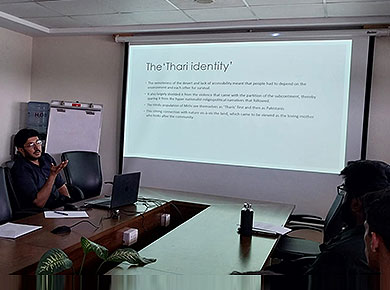
Dr. Zaheer Ali
13/05/2024
Development projects initiated without recognising the needs of local indigenous communities have drastic consequences and in some cases destruction of indigenous eco-systems developed through centuries of natural preservation, especially in more vulnerable lesser developed countries (Escobar; 1996, Cox; 2013, Ferguson and Lohmann; 1994 ). Through first-hand ethnographic accounts, this paper will shed light on the direct impact of the coal mining project on the local Hindu population of Thar desert in Pakistan. Adopting a critical development studies approach the study demonstrates that the connectivity of remote desert area to mainland Pakistan through newly constructed roads has had direct consequences on the preserved secular culture of the area resulting in religiously motivated Hindu-Muslim conflict. The toxic waste excreted from the coal mining project in Thar desert has adversely impacted the indigenous flora and fauna, local wildlife and the nomadic pastoralist communities. The environmental impact of the gentrification of the Thar desert has resulted in the extinction of local trees and herbs used by the nomadic population for medicinal purposes as well as a source to feed their animals. Moreover, the untreated toxic waste directly released in the desert has resulted in the desertification of irrigation land, which has limited the livelihood potential of the indigenous Hindu population of Thar. Finally, findings have revealed that the isolation of Thar desert from rest of Pakistan protected it from the fundamentalist discourse of the country which has changed as a result of the development projects.
The relationship between housing conditions and prevalence of common mental health disorders (CMDs) among married women in two low-income settlements in Karachi
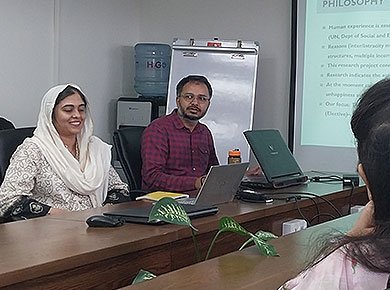
Dr Ayesha Zia & Dr Adam Abdullah
22/04/2024
This talk extends the investigators’ transdisciplinary work on the theme of Urban Mental Health (SSLA elective co-designed/co-taught by the investigators), specifically in the context of Karachi. Here, we present our research framework, the state of current international and contextual knowledge, and our proposed methodology, for feedback and final refinements before stepping into the field. Approximately 40% of Karachi’s population suffers from Common Mental Health Disorders (CMDs) such as depression, anxiety, phobias, panic disorders, obsessive compulsive disorder and post-traumatic stress disorder. Our study aims to draw insights on a specific sample population (female, married, 25-45 yrs, unemployed), from two selected sites: Orangi (WHO-5 score 24); Rahim Khan Goth (WHO-5 score 42). We employ DASS-21 and WHO-5 on samples from these two sites, and correlate the scores with housing conditions (materials, rooms, morphology, density, etc). to understand how (low-income) urban living correlates with particular CMDs.
Financial Fragility and Corporate Profitability Part II: Omega Sensitivity of Alpha

Dr. Ilfan Oh
22/04/2024
This talk is about the second part of our current research project. The objective of this research is to identify a nexus between idiosyncratic firm risk positions and the properties of competitive environment where profit-seeking firms operate under free entry and exit. To this end, we propose a novel concept - Omega Sensitivity of Alpha (OSA) - which gauges the marginal impact of firm profitability risk upon the intensity of competition. Using this concept and the accounting information of all listed US firms (excluding the banking sector) over the period 2001-2017, we provide evidence that a shock to the profitability risk, measured by the mean absolute deviation of the return on assets (profit rate), brings about the diametrically opposite competitive environments between financially fragile firms and financially sound firms, at margin.
The key findings of our study are twofolds: (i) OSA for the left tail of the firm profit rate distribution is consistently negative, which implies that the group of firms operating below the system-wide benchmark of profit rate is exposed to intensified competitive pressure, when there is a shock to the profitability risk. (ii) On the other hand, for 80% of the cases (14 out of 17 years), OSA for the right tail of the distribution is unambiguously positive. This finding suggests that, on average, a shock to the profitability risk dramatically reduces the level of competitive intensity for the group of firms maintaining the profitability above the system-wide benchmark.
We claim that these results verify the presence of capital market imperfections that underlie the quintessential asymmetry in firm competition subject to entry-exit dynamics. The ideas and the results in this research would contribute to integrating the ongoing research of financial market imperfections with the statistical equilibrium theory of firm competition.
Public Matters: Explaining Government Cooperation with Terrorists Using a Game Theoretic Model
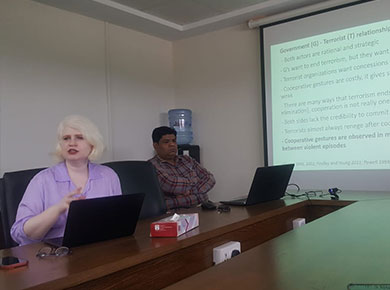
Dr. Laila Sohail Farooq
27/03/2024
"Governments frequently use cooperative measures when dealing with terrorist organizations, despite the absence of a credible commitment to peace from either side. If these measures are almost always followed by violent clashes, why do they remain a popular strategy? I argue that counter-intuitively, terrorist organizations are not the actual target of cooperative gestures. These gestures are instead intended to target publics, and the optimal strategy to combat terrorism is to use a combination of cooperative and conflictual tactics.
This paper seeks to model the strategic relationship between governments and terrorist organizations through a two-player repeated sequential game. I take the audience costs into account by including them in the payoffs for the two players and I account for dynamic changes such as terrorists becoming more efficient with tactics over time and governments losing more support the longer the violence has occurred. The model shows that the optimal strategy is to use cooperation and conflict as complements, rather than substitutes. I then test the findings of the formal model using data from the ICEWS dataset on three cases; the ETA in Spain, the TTP in Pakistan and the MILF in Philippines. The empirical evidence supports the predictions from the game theoretic model. Regime type, the institutional environment and the relationship of the terrorist group with the population all effect the frequency of cooperation and the intensity of force. This paper makes contributions both theoretically and empirically and has important implications for analyzing government-terrorist dyads."
Demand for LGBT Rights among Youth: The Case of a Muslim Majority Country
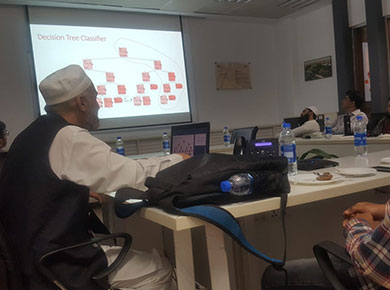
Dr. Adnan Haider
21/02/2024
This paper explores the intersection of LGBT rights and Islamic values in Pakistan, a Muslim-majority country where homosexuality is a criminal offense. The research aims to explore demand for LGBT rights among youth in Pakistan. Furthermore, the study also tries to understand the current state of LGBT rights in Pakistan, the role of religion and cultural norms in shaping societal attitudes towards the LGBT community, and the potential for change in the future. Through a comprehensive analysis of existing literature, as well as original survey interviews with young students in four different universities of Karachi (one of the largest city in Pakistan having population more than 20 million as of year 2023), members of the LGBT community and religious scholars, this thesis argues that while Islam does provide clear sharia based guidelines about LGBT rights and restricts these activities among Muslim population but the ongoing demand for these rights among youth in Pakistan also raised questions for policy makers and legislators to rethink their policies regarding LGBT community in Pakistan. The majority of youth considers that the cultural interpretations of the religion in Pakistan have led to a hostile environment for LGBT individuals. However, this research also highlights the efforts of activists and allies working towards greater acceptance and legal protections for the LGBT community in Pakistan, suggesting the potential for positive change in the future.
Help fee not so helpful: impact of net cash transfer on labour supply of households
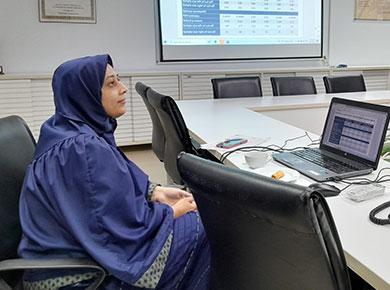
Shagufta Shabbar
31/01/2024
One of the major objectives of every government is to ensure the household’s ability to cope from shocks without generating any negative effects such as that on labor supply. This study attempts to find the impact of unconditional cash transfers (UCT), specifically, Benazir Income Support Program, on the labor supply decisions of the poorest households. This is analyzed taking into consideration the cost of collection of the UCT which may be as high as 22% of the total amount per visit. A major portion of this cost being the ‘help fee’ paid to the agents who hand over the transfer to the beneficiaries. The investigation of impact on labor supply is done using primary cross-sectional data that has been collected from three districts with varying levels of economic prosperity. Estimation results from fuzzy regression discontinuity design show that the total cost associated with collection dampens the effect of the UCT, if any, on the supply of labor as it significantly reduces the size of transfer. The evidence shows that there is no change in labor supply and negate earlier studies especially in the context of Pakistan regarding potential externalities of UCT. The policy makers need not be concerned with undesirable spillover effect of the transfer.
Gilgit-Baltistan conundrum: Socio-religious dynamics of Baltistan
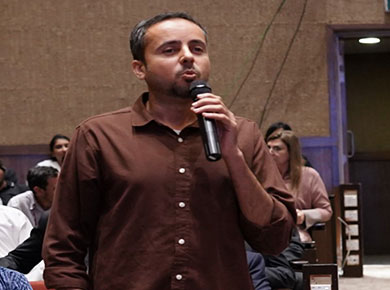
Dr. Sajjad Ahmad
04/12/2023
This talk focuses on Baltistan, which, over the past thirteen years, has been vocal in demanding its rights, uniting its people to voice strong protests against the federal government’s decisions, such as tax impositions, the termination of wheat subsidies, land reforms, and other local issues. The religious scholars (ulamā) wield significant influence over the populace and society in Baltistan. This talk focuses on the role of religious scholars and leaders in the political mobilization of the people of Baltistan, given the backdrop of the state’s efforts to grant greater liberties and enact reforms in Gilgit-Baltistan since 2009, in contrast to previous years when the region was administered entirely from the central government.
Pakistan & EU Trade Potential: The Bottlenecks and Roadmapfor Reforms

Dr. Adil Nakhuda
21/11/2023
Trade plays a vital role in driving economic growth, but Pakistan's trade performance has been volatile, with stagnant export grwoth and a rising trade deficit. The Generalized Scheme of Preferences (GSP) Plus is offered to a select group of exporters to the Euorpean Union (EU) based on a set of pre-defined criteria and the fullfilment of various conventions regarding human rights, labor rights, good governance, climate change, and environment protection. The main objective of this report is to identify the bottlenecks hindering trade growth between Pakistan and the EU and propose reforms to enhance bilateral trade relations so that Pakistan can more from the GSP Plus scheme.
Impact of a Capacity Building Intervention on Behavior of Farmers and Farmworkers in Pesticide Use and Safety Measures
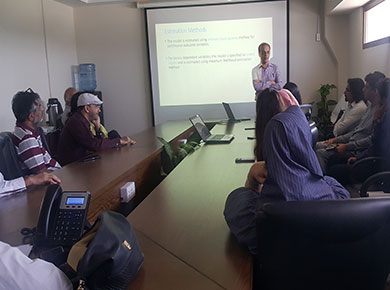
Dr. Heman Das Lohano
02/11/2023
Overuse and improper use of pesticides in the agriculture sector pose severe threats to plants, beneficial insects, animals, humans, and the overall environment. Given the low literacy rate and unawareness, the Centre for Agriculture and Bioscience International (CABI), in partnership with the Better Cotton Initiative (BCI), implemented a capacity-building intervention for farmers and farm workers in Sindh province of Pakistan. The study found that the BCI training was successful because the BCI project formed groups and provided training to groups of farmers. Reducing pesticide application would be beneficial only if a group of farmers in the entire location act jointly as there are leakages effects.
Frontier Rule and Conflict in North-West Pakistan
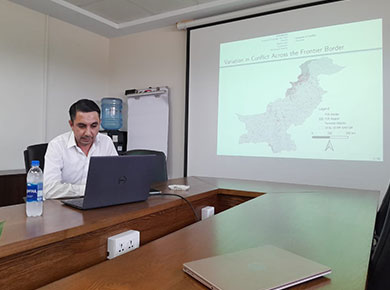
Dr. Faiz Ur Rehman
24/10/2023
Expanding body of scholarship has studied the economic and institutional drivers of conflict (Collier and Hoeffler 1998, 2004; Fearon and Laitin 2003; Miguel et al. 2004; Ciccone 2008), we have limited knowledge of the role of “specific political and legal institutions” in driving conflict (Blattman and Miguel 2010). We examine whether frontier rule, which disallows frontier residents from recourse to formal institutions of conflict management and disproportionately empowers tribal elites, provides a more fragile basis for maintaining social order in the face of shocks. Combining a historical border that separates frontier from non-frontier regions in north-western Pakistan with 10km-by-10km grid cell-level data on conflict in a spatial regression discontinuity design framework, we show that areas under frontier rule experienced significantly higher violence against the state after 9/11. We argue that the 9/11 tragedy represented a shock to grievances against the state which, in the absence of formal avenues of conflict management, led to a sharp surge in attacks against state targets in frontier regions. We show that the surge in ‘sovereignty-contesting’ forms of violence in these regions was partly carried out through the systematic assassination of tribal elites upon whom the whole edifice of social order was built.
Mapping the climate risk landscape of the Diamer-Basha Dam in Pakistan: A storyline approach.
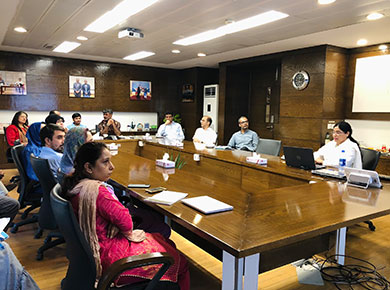
Dr. Lubna Naz
05/10/2023
The construction of the Diamer-Basha dam has exposed the population to multiple socioeconomic and ecological risks, including the carbon footprint associated with the hydro powerplant, the loss of ecosystem services and sustainable livelihoods, and forced migration. The findings call for using integrated approaches for assessing the climate risk landscape to steer disaster reduction strategies, interventions, and policies effectively.
Financial Fragility and Corporate Profitability: A Statistical Equilibrium Approach
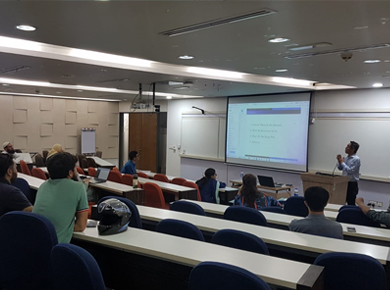
Dr. Ilfan Oh
22/05/2023
This presentation discusses an extension of our prior work (Mundt and Oh, 2019, Economics Letters). Using the methodology of sensitivity analysis, we propose the notion of "risk sensitivity of competitive intensity" which intertwines key observations in the field of capital market imperfections with the "statistical equilibrium" theory of firm competition. Further, we empirically examine this notion by adopting traditional measures of "financial constraints. Along with those measures, we introduce a new measure - "the default-risk-adjusted solvency ratio." The presentation also discusses the compatibility of this new measure with the traditional ones in reporting some findings for the US profitability distribution.
Representation of the Fall of Kabul 2021 in the Pakistani and Afghan Media
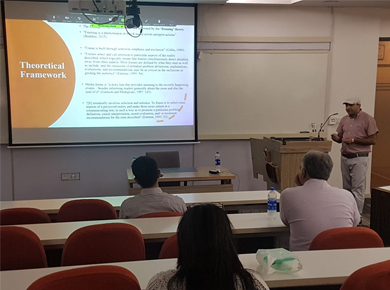
Dr. Amir Marwan
15/05/2023
This research study investigates the representation of the Fall of Kabul 2021 in the Pakistani and Afghan media. The researcher utilized the quantitative content analysis to understand the nature of coverage given to the event by Geo News, PTV News and TOLO News. The aim is to understand what these leading TV channels emphasized in their coverage to their viewers and what they ignored. Media coverage plays a significant role in making any public policy successful by reinforcing or mending public opinions. The framing theory informs the findings of this research study.
Ontological Securities and Existential Anxieties: A Case of Pakistani Sikhs
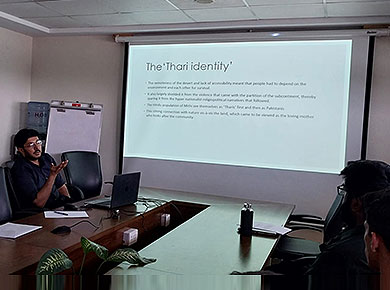
Dr. Zaheer Ali
09/05/2023
This paper uses an in-depth qualitative approach to understand the relationship between the social history of Pakistan, hegemonic state ideology and its impact on identities and belongings of Pakistani Sikhs. The historical events which have unfolded in the sub-continent in the last two centuries have directly/indirectly affected the everyday lives of Sikhs in contemporary Pakistani society. By drawing upon concepts from political sociology and sociology of religion this paper, explains the everyday practices adopted by Pakistani Sikhs to ensure their safety and create a sense of ontological security in an increasing Islamised Pakistani society.
Losing to Inflation: Unmasking Inflation Inequality among Households
Dr. Muhammad Nasir
03/05/2023
Households across the income distribution present different consumption baskets, with the result that aggregate inflation rates mask heterogenous welfare impacts since price trends for food, non-food, and energy differ. Given recent increases in energy and food prices in Pakistan, we estimate decile-specific inflation rates. Our results show that, between November 2018 and August 2022, lower-income households experienced inflation rates that were, on average, 1 percentage point higher than the inflation rate experience by the wealthiest households. Our results highlight that poorer households are more sensitive to food inflation, while increases in fuel and transport prices reduce the welfare of households in the top deciles. After quantifying how differential inflation rates have disproportionally impacted the poor, we suggest policy recommendations to help mitigate the impacts of inflation on the poor.
Migration and Wellbeing: Study of Two Informal Communities in Karachi
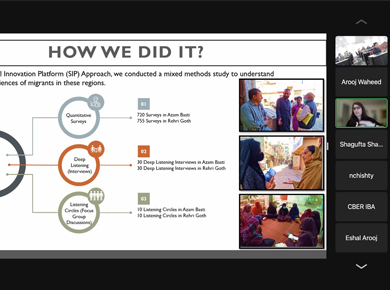
Aqsa Jawed, Arooj Waheed, and Fatima
17/04/2023
Last year, IBA conducted a study "Access to Justice and Human Rights for Development and Resilience of Informal Urban Communities" in collaboration with the UNDP and collected data from two informal settlements of Karachi, Azam Basti and Rehri Goth. The aim of the project was to strengthen inclusion of migrant populations by increasing their participation in development processes. Information on socio-demographic indicators, migration practices, housing conditions, utilities & infrastructure, healthcare, and comparative indicators for migrants was gathered. Using this data, our study will try to explore the determinants of migrant subjective wellbeing.
Hadith Selection Criteria in Sahih Muslim: A Quantitative Analysis
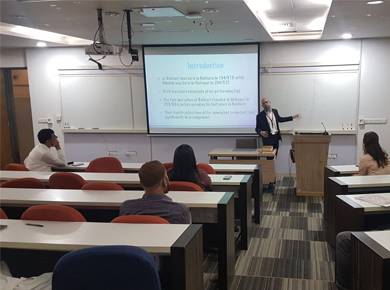
Dr. Azam Ali
10/04/2023
Over the ages, some critics have questioned the originality of the sahih collection compiled by the hadith scholar Muslim b. al-Hajjaj al-Naysaburi (d. 261/875), observing its overlap with the sahih collection of Muhammad b. Ismail al-Bukhari (d. 256/870). In a recent monograph on Muslim's life and works, Pavel Pavlovitch has questioned the validity of this view based on a sample of material from the two works. Through a quantitative analysis of material from earlier hadith collections alongside the "Six Books" produced by third/ninth century scholars, including al-Bukhari and Muslim, this study introduces a more rigorous approach to understanding the complex relationships among major hadith collections.
Linkages between Population Growth and Climate Change
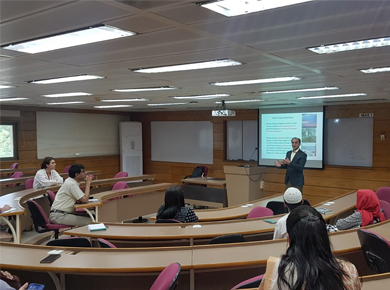
Dr. Heman Das Lohano
28/03/2023
This study explores implications for the linkages between fertility rates and the attainment of SDG 13 – "Take urgent action to combat climate change and its impacts". Based on the evidence in global literature on linkages between population growth and climate change, it can be concluded that the relationship between population growth and climate change is complex. This paper reviews various aspects of their linkages. Human population has a positive impact on total emissions and family planning is not only essential for attaining the sustainable development goal on climate change, but also crucial for accelerating the progress in achieving its targets. Additionally, family planning has the potential to mitigate climate change impacts including food insecurity and exposure to extreme heat and extreme droughts. Descriptive statistics and trend analysis on population growth, fertility rate, climate change impacts, emissions and coastal erosion in Pakistan highlight the country's alarming fertility rate of 3.5 and existing demand for family planning programs as well as its vulnerability to the impacts of extreme weather events between 1999 and 2018. The analysis suggests that climate change and population growth have strained Pakistan's natural resources and the country must adopt an integrated approach that jointly considers climate change, environment and population growth to mitigate the negative impacts of climate change.
Covid-19 recovery in urban informal settlements: Evidence from Karachi and Mumbai
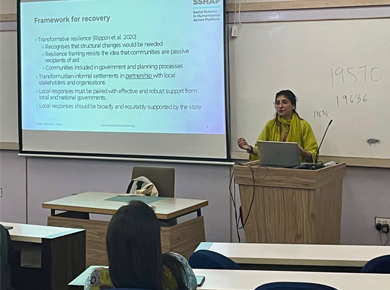
Saba Aslam
18/11/2022
This evidence review highlights local responses, grassroots efforts, and challenges around COVID-19 recovery within urban informal settlements in South Asia. It focuses on specific examples from Karachi, Pakistan, and Mumbai, India to inform policy responses for COVID-19 recovery and future epidemic preparedness and response. We show how local-level responses are shaped in these cities where national and international responses have not reached communities at municipal and sub-municipal levels.
The global pandemic brought renewed attention to the everyday challenges in informal settlements. COVID-19 reminded us of that southern urban life is rooted in 'collective' experiences where toilets and kitchens are shared by multiple families; where the categories of work and home, private and public space overlap; and where the majority live in vulnerable conditions (Bhan et al. 2020). Despite these challenges, we find that some of the most innovative and collective responses to COVID-19 have emerged from these areas. While informal settlements did face a host of risks and vulnerabilities during the pandemic, local responses have highlighted the resilience of informal settlement communities (Wilkinson 2020). However, few informal settlements are actually 'resilient' and any local responses must be robustly supported by system-wide change including support from local and national governments, improvements to build infrastructure, and improved access to health care services, among other priorities.
The article can be found on the website below:
https://www.socialscienceinaction.org/resources/evidence-review-covid-19-recovery-in-south-asian-urban-informal-settlements/
Thermal Practices, Heat, and Informality in Urban Pakistan
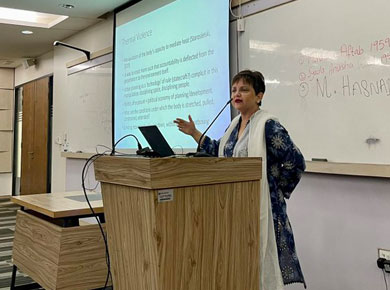
Dr. Nausheen Anwar
11/11/2022
Karachi is a highly unequal city in terms of land tenure, the durability of housing, and access to critical urban infrastructures, as well as variegated microclimates across its urban morphology. Akin to many cities across the global south (and north) Karachi’s planning legacy feeds into a current moment of ‘thermal inequality’ and ‘thermal violence’ that manifest through poor, and marginalized people’s experiences of extreme heat in a globally warming planet. Laboring metabolic bodies, heat, materials, and social reproduction, coalesce in complex ways to underwrite thermal practices and experiences of heat within homes and outside, in thermally exposed working environments. Thinking along these conceptual lines, we present tentative findings from ongoing fieldwork across 57 informal settlements and 46 outdoor occupation types. The surveys elicited data on thermal experiences and practices, as well as people’s access to critical urban infrastructures that buttress heat risk mitigation. We focus on spatially disaggregated data and discuss the significance of several key indicators in terms of their prevalence across the sites, e.g. basic socio-demographics, densities, and morphological indicators; specific indicators on thermal perceptions, such as the reliance on electricity vs. water as a primary source for heat mitigation; the inclusion of thermally appropriate cuisines and hydration practices; the compounded vulnerabilities brought about when access to infrastructures is undermined; access to green spaces for each community, and their usage. This is the first of its kind field exercise across Karachi, in terms of scale and the kinds of data being collected, and we look forward to a stimulating discussion. The data and inferences are tentative at this stage, and we intend to engage more deeply as fresh data continues to come in.
Teacher’s Instruction Leads to Improved Learner’s Understanding: An Action Research Study on Refining Verbal Instructions for Large Classroom teaching in a Business School of Pakistan
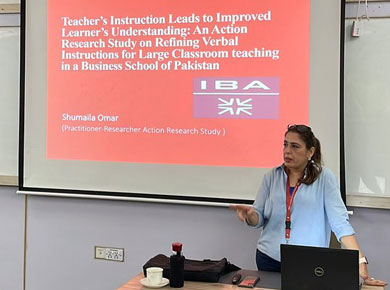
Shumaila Omar Zubair
04/11/2022
This study focuses on refining the verbal instructions of a practitioner and a researcher in Pakistani Business University's undergraduate program. In the given context, the students seldom have the opportunity of exploring their own teacher being video clipped for bringing about improvement in her teaching methodology. Since more importance is given to test, analyze, and evaluate students through finding their weaknesses, the teachers' own change in the classroom is mostly overlooked, resulting in a monotonous continuous cycle of teaching at a Higher Education. The study further highlights the self-developed strategies of the researchers in improving her current teaching practices through a systematic approach of action research using peer observation, critical friend, video-clips, pictures, and reflections. Findings of pre- and post-intervention phases of four cycles revealed that diagnosing self- problematic areas of one-self can help teachers recognizing their own loopholes in teaching practices, whereas, providing a platform for a well-managed and disciplined large class. This study further shows new ways for novice and experienced practitioners and researchers to reflect upon their verbal instructions in their context. It also sheds light on the implications for teachers and students at a university level.
The Mantegna tarocchi twin E and S series and the god of twinship, Hermes
Dr. Nadya Qamar Chishty-Mujahid
2/10/2022
Hermes/Mercury, the god of twins (as attested to by the constellation Gemini which is ruled by him) is also the presiding deity of the quattrocento (fifteenth century) Mantegna and Sola Busca tarocchi. These tarocchi are images on copperplate engravings, which when taken in conjunction form a caduceus (the symbol of Hermes) in the case of the Mantegna set and a sundial in the case of the Sola Busca set. The caduceus, that depicts twin snakes winding harmoniously around Hermes's staff is a symbol of peace. It displays a hierarchical masculine Italian brotherhood that can be perceived by examining the mutus liber (silent book) figured forth by the Mantegna tarocchi. The Sola Busca sundial was most likely affiliated with Pomponio Leto's Roman Academy, a very early version of Western Illuminati. It is also a mutual liber which connotes the blueprint of the initiation ritual of this erudite and influential secret society.
Nature Capital/ Economic Valuations of Priority Ecosystem Services in the Indus Delta Ecoregion Landscape - A Benefit Transfer Study
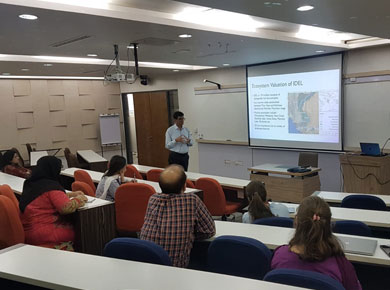
Dr. Junaid Alam Memon
30/09/2022
Indus Delta Ecoregion Landscape (IDEL) is the part of a larger global pilot, the Dutch Fund for Climate and Development (DFCD), that realizes the gap in SDGs financing and aims to bridge it through private sector engagement in the bankable natural solutions. The idea is to support initiatives that can simultaneously generate returns on investments and environmental benefits. This valuation was conducted understanding that its results will serve as the basis to generate bankable ideas that may attract private sector investment in environmentally important interventions.
Is Instrumentalism a plausible philosophy of science for Muslims?
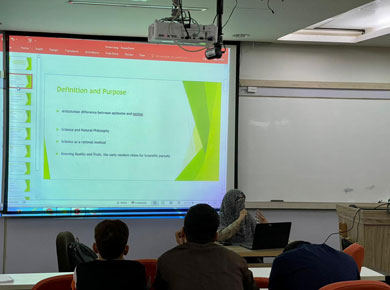
Dr. Amana Raquib
23/09/2022
The contemporary philosophy of (natural) science does not warrant strong realism with regards to the scientific theories, models, and unobservable theoretical entities characterizing those theories (such as atoms, electrons, DNAs). The history of modern science has shown that in the past, many scientific theories and models were pragmatically efficient and led to explanations and true predictions for long periods but were abandoned later on and replaced by other theories. Even at the same time, there can and does exist more than one theory or model to explain a given set of observations/data, labeled as underdetermination. The fallibilism, underdetermination, and inequivalence of scientific theories strengthen the instrumentalist position that these are not representations of an underlying reality, but rather convenient, practical models or instruments for the explanation and prediction of natural phenomena. This position is called instrumentalism and takes various forms in the contemporary debate within the philosophy of science. In the Islamic tradition, seeking knowledge is an act of worship and enjoys very high status. Muslim theologians (usulis) and kalam practitioners have always sought to categorize various knowledge disciplines (sciences) according to whether they can reach al-Haqq/ Reality or Truth or they serve as beneficial arts and crafts (funun) that allow human beings to develop various practical methods. The challenge that Muslims face today is how to categorize and place the knowledge/s coming from modern scientific disciplines and the various theoretical models in their hierarchy of knowledge. Whether those are considered in realist or instrumentalist terms, means having entirely different statuses within the Islamic epistemology. Either position would have implications for the status of science within the Muslim culture, science teaching and the use of those scientific theories, concepts, entities, and insights for juristic (fiqhi) opinions.
Country level Assessment of Food Loss and Waste in Pakistan
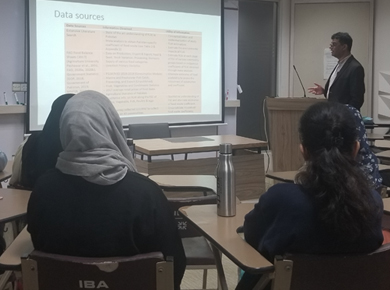
Junaid Alam Memon
26/11/2021
Amid looming water stress and rapid population growth, food loss and waste (FLW) are emerging concerns for Pakistan but without macrolevel understanding of the issue. Through Mass Flow Approach, we delved deeper into FLW issue and produced the first ever country level estimates of FLW based on best available secondary statistics and literature reviews. Results suggest that some 18 megatons (Mt.) or nearly 15% of all food produced in Pakistan is lost and wasted along the Food Supply Chain (FSC). Of this, the 'losses' accounted for 13.6 Mt or 11.3%, and the 'wastes' accounted for 4.32 Mt or 4.7% of the food produced in the country. Three-fourth of the food that leaks out of the FSC is loss - 14% occurring during harvest, 21% in post-harvest and handling, 18% during processing and 23% in the wholesale market. The remaining one-fourth is food waste - 18% occurring at retail market and 7% in household. The economic cost of FLW amounts to PKR 2.17 trillion or USD 20.72 billion or 7 % of the country's Gross Domestic Product in 2017. The loss estimates are equal to 35 trillion calories or 13.8 % of the total calories produced in Pakistan, besides having huge land and water footprints. Based on the review of global best practices of managing FLW to curb this hidden driver of hunger and alleviate unnecessary pressure from our food production systems, we recommend policies promoting circular economic model of food production and consumption.
Keyword: Food Loss, Food Waste, Food Value Chain, Responsible Production and Consumption
On Analyzing Unstructured Text - Using Twitter as a Case Study
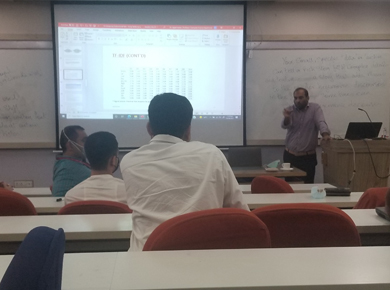
Dr Sajjad Haider
29/10/2021
The session would introduce the audience to software tools and mathematical foundations to analyze free text available in the form of newspaper articles, tweets on Twitter, comments on Facebook and on other social media platforms. After a general discussion on handling raw text data, a case study from Twitter would be presented to better understand the potential of Text Analytics.
Impact of development schemes on the lives of people of district Ghanche, Gilgit-Baltistan
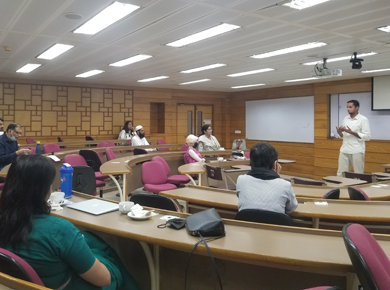
Sajjad Ahmad and Irene Martinez
01/10/2021
Ghanche is one of the least developed districts of Gilgit-Baltistan having extreme poverty. The primary reason of poverty and lack of availability of basic social services such as health, sanitation and education is the absence of state. Since past few years, many NGOs and donor organisations have focused the remote areas of Ghanche district and initiated several projects and schemes to provide or improve livelihoods and social services to the local people. The aim of this project is to assess the impact of those initiatives on the lives and livelihoods of the local people of district Ghanche.
Self-perceived life satisfaction: Evidence from a longitudinal study
Dr. Asma Hyder
17/09/2021
The perceptions of citizens about society and their own lives in self-reported life satisfaction are vital for a democratic society. There is an increasing debate in economics about self-perceived happiness, quality, and satisfaction in life; this literature is limited in developing countries, especially in context of Pakistan. This paper is a longitudinal study of the relationship between self-perceived life satisfaction and self-perceived income, health, and governance. The study also aims to attempt to include twitter analytics and few variables from secondary data sources.
JEL Code: I310, I380, Y80
Key words: Well-being, Inequality, Quality of life, Social indicators